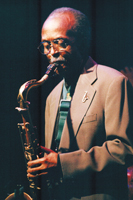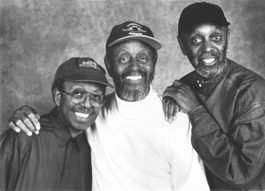home | metro santa cruz index | music & nightlife | profile

Bop Notch: Tenor sax man Jimmy Heath has been an icon to younger players, including John Coltrane.
Brothers From a Jazz Planet
Along with the late Percy, Jimmy and Tootie Heath made music history
By Andrew Gilbert
Long before Wynton and Branford made the Marsalis name synonymous with jazz, the Heath brothers staked a claim as one of the form's most illustrious families.
Raised in Philadelphia in the 1940s and '50s, when the scrappy city boasted a particularly vital music scene, the Heath siblings have made huge, if sometimes overlooked, contributions to jazz. The eldest brother, the late bassist Percy Heath, was best known for his 40-year membership in that most elegant of bands, the Modern Jazz Quartet. Jimmy, 81, is a compelling hard bop tenor saxophonist and eminent composer/arranger; and Albert, 72, known to friends and acquaintances as Tootie, is a supremely versatile and swinging drummer who's recorded with everyone from John Coltrane and Wes Montgomery to avant-garde pioneers Anthony Braxton and Roscoe Mitchell.
Since Percy's death in 2005 at the age of 81, Jimmy and Tootie have continued to work together as the Heath Brothers, and they perform two shows Thursday night at Kuumbwa with bassist Joe Sanders and pianist Jeb Patton. It's an ensemble that took shape relatively late for the brothers. While they recorded together occasionally in their early years, it was only in 1975 that they came together officially as a family band.
After an initial run produced several acclaimed albums, the Heaths took a decade hiatus, then reunited in the mid-1990s, recording two excellent albums for Concord Jazz. Despite the loss of their elder brother, Jimmy and Tootie are still going strong.
"Let's face it, we are the older guys out here now," says Jimmy, speaking by phone from Brooklyn. "We came from the same source. We can achieve a certain feeling that to us seems very pleasing and very happy. My mother and father both had a hell of a sense of humor, and that rubbed off on us."
For the brothers, the question of how one family could produce three world-class musicians has an obvious answer. Besides providing them with a stable, loving family life, their parents brought music into the house in a myriad of ways.
"My father was a clarinet player from the heart, and an automobile mechanic out of necessity," Tootie says. "My mother was a beautician, and she sang in the church choir. He had a very wide selection of records, from Bessie Smith to operas, and of course the big band music of Fletcher Henderson, Ellington and Basie. We heard it all right there in the house. Our parents gave us a very well-rounded education in music."

Sibling Revelry: Elder statesmen of jazz the Heath Brothers (Jimmy,the late Percy and Tootie) took the Philadelphia sound to the world stage.
Though he's the middle brother, Jimmy was the first of the Heaths to start playing music professionally. Looking for a vehicle with which to explore his writing, he assembled a big band that attracted many of Philadelphia's leading young musicians, including future jazz stars Benny Golson, Specs Wright, Johnny Coles, Nelson Boyd and John Coltrane, who cited Heath as an early influence.
"I was fortunate enough to have a lot of talented people around Philly," Heath says. "The only downside is we never recorded. A lot of times we even rehearsed in my mother's living room, a pretty unique situation in that my mother and father were so in tune with the music and supported all of us in our musical endeavors."
In 1947-48, both Jimmy and Percy played with trumpeter Howard McGhee's sextet, one of the first true bebop combos, then joined Dizzy Gillespie's great but short-lived big band. Jimmy's facility on alto sax with the advanced harmonic idiom of Charlie "Bird" Parker gained him the nickname "Little Bird." Like many alto players of the day, he soon took up the tenor to escape Bird's daunting shadow, and by the time he and Percy recorded with Miles Davis in 1953 he had mastered the larger horn.
"Trombones and altos had a serious problem getting gigs in Philly with the small groups in the clubs," Jimmy says. "I also thought the tenor voice would allow one to be more of an individual. But we all still ended up playing Charlie Parker."
After a few years off the scene in the mid-'50s due to substance abuse, Jimmy made The Thumper for Riverside in 1959. Using his brothers as sidemen whenever possible, he recorded a series of brilliant albums for the label, cementing his reputation one of jazz's most inventive small group arrangers. In fact, with jazz standards such as "CTA," "For Minors Only" and "Gingerbread Boy" to Heath's credit, his growing stature as a writer often overshadowed his beautiful, emotionally nuanced tenor work.
"In part it's the way I've presented myself," says Heath, who retired from his longtime position as a music professor at Queens College a decade ago. "Almost all my records have been with sextets, quintets, tentets or big bands, where other people are featured. All the guys who are recognized as saxophonists are guys who make quartet records, and they play the melodies and the solos on every song."
These days, however, Heath is gaining recognition both through his compelling improvising and a fascinating 70-minute documentary DVD, Brotherly Jazz, produced by Danny Scher, a jazz fan who made his name in the music business as vice president of Bill Graham Presents. The film is more of a character study than a detailed account of the brothers' careers (that would require a multipart series). By sketching the Philadelphia scene out of which they emerged and briefly highlighting key moments in the Heaths' lives, the film creates a vivid sense of each brother's personality, capturing Percy's quiet self-confidence, Jimmy's sensitive pride and Tootie's affable humor.
"If we had gone in depth on our careers, it would have been twice as long," says Jimmy, whose autobiography I Walked With Giants is due out on Temple University Press later this year. "I mean, I started in 1945 while Percy was in the service. It encapsulizes what we have contributed to the music world."
Among Brotherly Jazz's highlights is Percy talking about his experience as a Tuskegee Airman in the segregated military of World War II and how he decided to become a bass player after mustering out of the service, eventually landing his defining gig with the Modern Jazz Quartet. In the film's most moving passages, Jimmy talks about taking up heroin to assuage his hurt over the breakup of a relationship, and how he returned to the music scene in the mid-1950s after several years in prison. Tootie's illustrious career gets the shortest shrift, but he fires off the film's best line, noting that "had it not been for my older brothers, I might have gone astray and become a doctor or lawyer."
The Heath Brothers play Thursday, July 19, 7 and 9pm, at Kuumbwa Jazz Center, 320-2 Cedar St.; $25/$28; 831.427.2227.
Send a letter to the editor about this story.
|
|
|
|
|
|